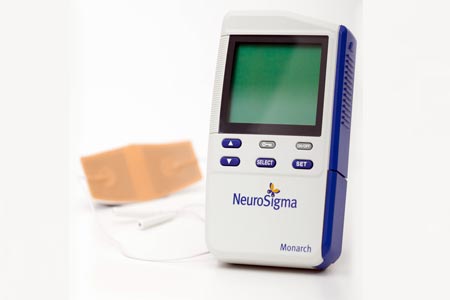NeuroSigma, Inc., a Los Angeles-based bioelectronics company focused on commercializing Trigeminal Nerve Stimulation (TNS) technology for treating neurological and neuropsychiatric disorders today announced that its Monarch® eTNS® System (Monarch) received FDA clearance as a non-drug treatment for attention deficit hyperactivity disorder (ADHD).
The prescription-only Monarch device is indicated for treatment of pediatric ADHD as a monotherapy in patients ages 7 through 12 years old who are not currently taking prescription ADHD medications. The device is intended to be used in the home under the supervision of a caregiver during periods of sleep.
"We are extremely pleased by FDA's clearance of the Monarch as a monotherapy for pediatric ADHD. We want to thank the FDA team for their efforts during the review process to bring it to a timely and successful completion," said Leon Ekchian, Ph.D., President & CEO of NeuroSigma. "We also want to applaud the efforts of the clinical team at UCLA. We look forward to building a commercial organization in the U.S. to offer children, their parents and their physicians a compelling, low-risk, non-drug alternative to current medication treatment options for ADHD," added Ekchian.
"I am excited that we found significant reductions in ADHD symptoms, as well as associated improvements in brain functioning, as a result of TNS therapy," said James J. McGough, M.D., the principal investigator of the pivotal trial and Professor and child psychiatrist at the Jane & Terry Semel Institute for Neuroscience and Human Behavior at UCLA. "Treatment was well accepted by patients and families, compliance was high, and the results demonstrated a favorable safety profile for the device. TNS has great potential as an additional option for managing ADHD," added McGough.
NeuroSigma's Monarch eTNS System received marketing clearance via the de novo pathway, which is typically used for clearance of novel medical devices that are deemed low- to moderate- risk. Results from the pivotal trial were recently published in the April 2019 issue of the Journal of the American Academy of Child and Adolescent Psychiatry. The trial was conducted at the University of California, Los Angeles (UCLA), enrolled 62 children ages 7 – 12 with moderate to severe ADHD to use the device nightly for 4 weeks, during sleep. The trial's primary endpoint was the ADHD-RS-IV scale, a scale for assessing ADHD severity that is commonly used in clinical trials of ADHD therapies. After 4 weeks, children randomized to the treatment group showed significant improvements on the ADHD-RS-IV scale as compared to the control group (p = 0.005). Statistically significant improvement in the treatment group compared to the control group was also observed on the CGI-I assessment (p=0.003), a secondary endpoint in the study. The most common side effects observed with eTNS use were: drowsiness, an increase in appetite, trouble sleeping, teeth clenching, headache and fatigue. No serious adverse events were associated with use of the device.
"Based on results from the open label and pivotal trials of eTNS for pediatric ADHD, we believe that eTNS fulfills a significant unmet need in the ADHD treatment paradigm," said Colin Kealey, M.D., NeuroSigma's Vice President of Medical Affairs.
"We would like to thank Dr. James McGough and his team at UCLA for conducting the pivotal trial that served as the basis for FDA clearance," said Ian Cook, M.D., NeuroSigma's Chief Medical Officer. "We look forward to launching eTNS in the United States and bringing this new treatment modality to children with ADHD," added Cook.
Background – TNS:
The trigeminal nerve is the largest cranial nerve, offering a high-bandwidth pathway for signals to enter the brain, bilaterally and at high frequency. The trigeminal nerve projects directly or indirectly to specific areas of the brain, such as the locus coeruleus, nucleus tractus solitarius, thalamus, and the cerebral cortex, which are involved in attention-deficit hyperactivity disorder (ADHD) and other disorders.
Trigeminal Nerve Stimulation (TNS) is mild electrical stimulation of branches of the trigeminal nerve, including those located near the surface of the forehead. Functional neuroimaging data suggests the mechanism of action of TNS is related to its ability to modulate activity in targeted brain regions.
eTNS, Monarch, and Monarch eTNS are trademarks of NeuroSigma, Inc.
About For more information about NeuroSigma, please visit www.neurosigma.com.



